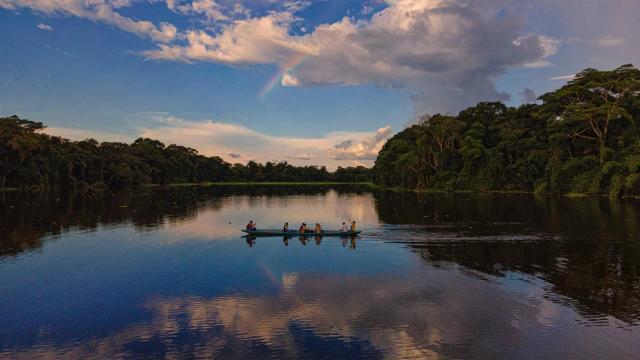Science Panel for the Amazon hosts session during AAAS annual meeting to discuss conservation, restoration and bioeconomy
On Monday, February 8 SPA leadership and a select group of lead and contributing authors participated in a virtual session of the AAAS Annual Meeting that explored ways in which restoration and deforestation reduction can be used to mitigate threats, support Amazonian landscapes in order to conserve biodiversity, sustain local livelihoods, and maintain high carbon stocks and ecosystems processes throughout the 21st century.
SPA Co-chair Carlos Nobre moderated the session “Amazon Development Pathways: Fostering Conservation and Prosperity,” which had the participation of SPA’s authors Ricardo Abramovay, Jos Barlow, Joice Ferreira, Paulo Moutinho, Plinio Sist and Mariana Varese.
By exploring experiences and best practices developed by local people, entrepreneurs, decision-makers, activists, scientists, and other key actors actively working across the Amazon, the panelists emphasized successful examples of how cooperative learning and knowledge sharing among indigenous peoples, traditional communities, and scientists is improving management of common lands and natural resources, while protecting rights at multiple spatial scales.
Amazonian forests are facing threats from deforestation, forest fires, logging, pollution, and climate change. According to Nobre, “The Amazon is under serious risk of disappearing. Deforestation rates have been increasing - they exceed 20,000 km2 in 2020, with more than 50% of that figure pertaining to the Brazilian Amazon. Also, forest degradation had a record-breaking number of forest fires. We really have to find a new alternative path for development in the Amazon. This is a challenge for all of us - particularly the Amazonian countries; it has to be led by Amazonian countries – but it is a global engagement overall. The Science Panel for the Amazon is directly dealing with those issues. How to identify a sustainable future? How to identify sustainable pathways for the Amazon? In this sense, science diplomacy is critical, because we have to communicate science broadly to all audiences, to policymakers, private sector, society at large, to the Amazonian people, in order to preserve the rights of the traditional populations of the Amazon. So, the SPA’s goal is to gather top-notch scientific knowledge and disseminating it broadly, globally, and particularly among the Amazonian countries to disruptively find a different type of development.”
You can read more about the AAAS annual meeting here.
